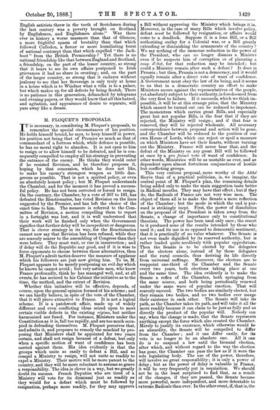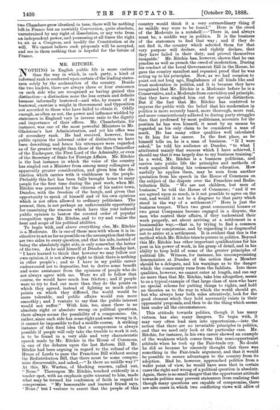M. FLOQTJET'S PROPOSALS.
IT is necessary, in considering M. Floquet's proposals, to remember the special circumstances of his position. He holds himself bound, he says, to keep himself in power, his position not being that of Premier so much as that of commandant of a fortress which, while defence is possible, he has no moral right to abandon. It is not open to him to resign or to allow himself to be defeated, and he is con- sequently compelled to employ all his strategy in preventing the entrance of the enemy. He thinks they would enter if he resisted Revision, and he therefore proposes it, hoping by that concession, which he does not like, to make his enemy's strongest weapon as little dan- gerous as possible. That is not a spirited policy, or even an absolutely honest policy ; but M. Floquet understands the Chamber, and for the moment it has proved a success- ful policy. He has not been outvoted or forced to resign. On the contrary, the Chamber, by a vote of 307 to 181, has defeated the Reactionaries, has voted Revision on the lines suggested by the Premier, and has left the choice of the exact time to him. The measure is referred to the Com- mittee of Revision, a motion compelling them to report in a fortnight was lost, and it is well understood that their work will be finished only when the G-overnment signifies that further delay will be inexpedient or dangerous. That is clever strategy in its way, for the Reactionaries cannot now say that Revision has been refused, while they are scarcely nearer to the assembling of Congress than they were before. They must wait, or rise in insurrection ; and if delay will do the Republic any good, and if it is wise to force opponents to choose between those alternatives, then M. Floquet's adroit tactics deserve the measure of applause which his followers are just now giving him. To us, M. Floquet appears to be merely postponing an evil day which he knows he cannot avoid ; but very astute men, who know France profoundly, think he has managed well, and, at all events, he has secured to his Cabinet the initiative as to the time, the method, and the extent of Revision.
Whether this initiative will be effective, depends, of course, upon the general opinion formed of his scheme ; and we can hardly believe, in spite of the vote of the Chamber, that it will prove attractive to France. It is not a logical scheme. It is a patchwork affair, made up of widely different and even conflicting ideas seized upon to meet certain visible defects in the existing regime, but neither harmonised. nor fused. For instance, Ministers under the Constitution as it is, fall too rapidly, and are too much occu- pied in defending themselves. M. Floquet perceives that, and admits it, and. proposes to remedy the mischief by pro- posing that Ministers shall be appointed for two years certain, and shall not resign because of a defeat, but only when a specific motion of want of confidence has been carried against them. His idea evidently is that the groups which unite so easily to defeat a Bill, and so compel a Ministry to resign, will not unite so readily to expel a Ministry. Their motive will be more patent to the country, and they will be more reluctant to assume so grave a responsibility. The idea is clever in a way, but we greatly doubt its success. French Deputies who are tired of a Ministry will vote for its dismissal just as readily as they would for a defeat which must be followed by resignation, perhaps more readily, for they may approve a. Bill without approving the Ministry which brings it in. Moreover, in the case of many Bills which involve policy, defeat must be followed by resignation, or affairs would come to a deadlock. Suppose it is a loan Bill, or a Bill authorising outlay for a Colonial war, or a Bill greatly extending or diminishing the armaments of the country ? We say nothing of the immense reduction in the power of the President, who can no longer dismiss a Minister even if he suspects him of corruption or of planning a coup d' etat, for that reduction may be intended ; but could a Ministry remain after such a defeat ? It does in Prussia ; but then, Prussia is not a democracy, and it would equally remain after a direct vote of want of confidence. A Government must obey the law of its being, and it seems to us that in a democratic country an effort to make Ministers secure against the representatives of the people, yet absolutely subject to their authority, is foredoomed from the very first to failure. If it succeeds, which we think im- possible, it will be at this strange price, that the Ministry which cannot be turned out can be reduced to impotence. The momentum which carries great Bills, and especially great but not popular Bills, is the fear that if they are rejected, the Ministry will resign ; and if that fear is removed, they will be rejected wholesale. All necessary correspondence between proposal and action will be gone, and the Chamber will be reduced to the position of our own House of Lords, which can reject or spoil a measure on which Ministers have set their hearts, without turning out the Ministry. France will never bear that, and the defeat of the Ministry on any great Bill will be followed at once by a pro forma: vote of want of confidence. In other words, Ministries will be as unstable as ever, and as dependent upon almost fortuitous conjunctions of hostile but conflicting groups. This very curious proposal, more worthy of the Abbi.: Sieyes than of a practical politician, is, we imagine, the central point of M. Floquet's plan, the remaining details being added only to make the main suggestion taste better in Radical mouths. They may have that effect ; but if they do, the Radicals of France are not very wise men. The object of them all is to make the Senate a mere reflection of the Chamber ; but the mode in which the end is pur- sued is strikingly inept. First, the power of dissolution on the proposal of the President is taken away from the Senate, a change of importance only to constitutional theorists. The power has been used only once ; the resort to it produced none of the results intended by those who used it ; and its use is so opposed to democratic sentiment, that it is practically of no value whatever. The Senate is not even made dignified by its reserved authority, but is rather loaded quite needlessly with popular opprobrium. Then the Senate is to be elected by the delegates of the electors alone, instead of by those delegates and the rural councils, thus deriving its life directly from universal suffrage. Moreover, the electors are to reappoint one-third of the Chamber and the Senate every two years, both elections taking place at one and the same time. The idea evidently is to make the Senate a reflex of the Chamber, both springing from the same source, and both being periodically renewed under the same wave of popular emotion. That will scarcely succeed. The two bodies are similarly elected, but they remain two bodies, and no two bodies ever merge their existence in each other. The Senate will take its path, as the Chamber takes its path, and will take it all the more readily because it can claim to be just as fully and as directly the product of the popular will. Nobody can say, when the change is made, that the Senate represents anything except the force which also created the Chamber. Merely to justify its existence, which otherwise would be an absurdity, the Senate will be compelled to differ from the Chamber ; and it can differ easily, for its veto is no longer to be an absolute one. All it can do is to suspend a law until the biennial election, after which, and without regard to the way the election has gone, the Chamber can pass the law as if it were the sole legislating body. The use of the power, therefore, will involve no great responsibility ; it is only a power of delay ; but as the power of delay is valuable in France, it will be very frequently put in requisition. We should not be in the least surprised to find that, as a result of the changes, if they are passed, the Senate became more powerful, more independent, and more detestable to extreme Radicals than ever. In the other event, if, that is, the two Chambers grow identical:in tone, there will be nothing left in France but an unwieldy Convention, quite absolute, unrestrained by any right of dissolution, or any veto from an independent power, and possessing at all times the right to,, sit as a Congress, and modify the Constitution at its wilL We cannot believe such proposals. will be accepted, and see in them nothing that is hopeful for the future of France.



































 Previous page
Previous page